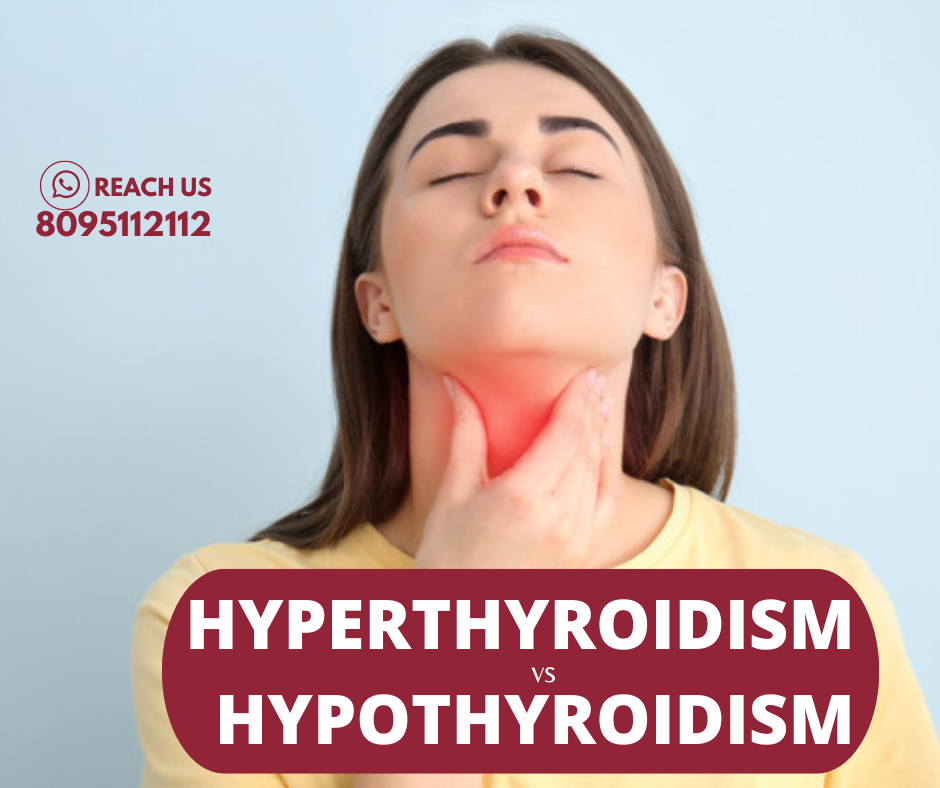
Difference between Hypothyroidism and Hyperthyroidism
Share


- Description: Underactive thyroid, where the thyroid gland does not produce enough thyroid hormones.
- Symptoms: Fatigue, weight gain, cold sensitivity, dry skin,hair loss
- Description: Overactive thyroid, characterized by excessive production of thyroid hormones.
- Symptoms: Weight loss, rapid heartbeat, anxiety, heat intolerance, tremors.
- Description: An autoimmune disorder where the immune system attacks the thyroid gland, leading to hypothyroidism.
- Symptoms: Fatigue, weight gain, depression, and an enlarged thyroid (goiter).
- Description: Another autoimmune disorder, causing hyperthyroidism by stimulating excessive thyroid hormone production.
- Symptoms: Weight loss, rapid heartbeat, bulging eyes (exophthalmos), and anxiety.
- Description: Abnormal growths or lumps in the thyroid gland, which can be benign or malignant.
- Symptoms: Often asymptomatic, but larger nodules may cause difficulty swallowing or breathing.
6.Thyroid Cancer:
- Description: Malignant growth of thyroid cells.
- Symptoms: Usually presents as a thyroid nodule; other symptoms may include voice changes, difficulty swallowing, or swollen lymph nodes.
7.Thyroiditis:
- Description: Inflammation of the thyroid gland.
- Symptoms: Can be hyperthyroid (initial inflammation releases stored hormones) or hypothyroid (chronic inflammation impairs hormone production).
8.Congenital Hypothyroidism:
- Description: A condition present at birth where the thyroid gland does not develop properly or is absent.
- Symptoms: Intellectual disability, growth delay, and developmental issues if not treated promptly.
9.Postpartum Thyroiditis:
- Description: Inflammation of the thyroid that occurs after childbirth.
- Symptoms: Can manifest as hyperthyroidism followed by hypothyroidism, often resolving over time.
10.Subacute Thyroiditis:
- Description: Inflammation of the thyroid, often following a viral infection.
- Symptoms: Painful thyroid, fever, and temporary hyperthyroidism followed by hypothyroidism.
But here in this article we will only discuss about HYPOTHYROIDISM AND HYPERTHYROIDISM
Difference between hyperthyroidism and hypothyroidism.
The key differences between hypothyroidism and hyperthyroidism:
Hypothyroidism:
-
Definition:
- Hypothyroidism refers to an underactive thyroid, where the thyroid gland does not produce enough thyroid hormones (T3 and T4).
-
Causes:
- The most common cause is autoimmune thyroiditis (Hashimoto's disease), where the immune system mistakenly attacks the thyroid gland. Other causes include iodine deficiency, certain medications, and surgical removal of the thyroid.
-
Symptoms:
- Extreme Fatigue
- Unexplained Weight gain
- Cold sensitivity
- Pale, Dry skin and hair.
- Constipation
- Depression
- Muscle weakness
- Increased sensitivity to cold
- Joint and muscle pain
- Low mood and heightened feelings of depression
- Slower heart rate
- Reduced sweating
- Facial puffiness
- Hoarse voice
- Heavier menstrual periods
- Elevated bad cholesterol
- Changes in sex drive, painful intercourse, and impaired arousal
-
Metabolic Effects:
- Slowed metabolism
-
- Elevated TSH (Thyroid-Stimulating Hormone) levels
- Triiodothyronine (T3)
- Tetraiodothyronine (Thyroxine OR T4)
- Calcitonin
-
Treatment:
- Typically involves synthetic thyroid hormone replacement (e.g., levothyroxine) to bring hormone levels back to normal.
Hyperthyroidism:
-
Definition:
- Hyperthyroidism refers to an overactive thyroid, characterized by excessive production of thyroid hormones (T3 and T4).
-
Causes:
- The most common cause is Graves' disease, an autoimmune disorder that stimulates the thyroid to produce too much hormone. Other causes include thyroid nodules or inflammation.
-
Symptoms:
- Weight loss
- Rapid heartbeat
- Heat intolerance.
- Tremors
- Sweating
- Bulging eyes (exophthalmos) in Graves' disease
- Increased sensitivity to heat
- More frequent bowel movements or diarrhea
- Increased appetite
- Anxiety and nervousness
- Irritability
- Sleep disturbances.
- Trembling hands and fingers
- Muscle weakness
- Eye changes, including irritation, redness, or bulging
- Changes in menstrual periods
- Sweating more than usual
- Altered sex drive, painful intercourse, and impaired arousal
-
Metabolic Effects:
- Increased metabolism
-
- Low TSH levels
- Elevated levels Triiodothyronine (T3) and Tetraiodothyronine (Thyroxine OR T4)
- Calcitonin
-
Treatment:
- Treatment options may include medications to suppress thyroid function (anti-thyroid drugs), radioactive iodine therapy, or, in some cases, surgical removal of part or all of the thyroid gland.
Hypothyroidism and Hyperthyroidism effect differently on both men and women
In terms of the impact of thyroid disorders, there are notable differences between men and women.
Women are more prone to developing thyroid diseases than men, which can have repercussions on their reproductive health, including menstrual cycles and fertility. Additionally, the symptoms of thyroid disorders in women may mimic those associated with menopause.

The manifestation of symptoms in women depends on whether the thyroid is overactive (hyperthyroidism) or underactive (hypothyroidism). Sexual health can be affected in both scenarios.
In men, thyroid disease is less common, but if present, they may experience typical symptoms of hypothyroidism or hyperthyroidism. Thyroid disorders can also affect men's sex hormones, leading to issues such as hair loss, reduced sex drive, muscle loss, erectile dysfunction, and other complications like gynecomastia and infertility.

Both hypothyroidism and hyperthyroidism can potentially result in secondary complications, including blood clots, stroke, heart failure, eye complications (ophthalmopathy), osteoporosis, infertility, high cholesterol, and, in severe cases, myxedema coma—a life-threatening slowing of the body's functions. It's crucial for individuals experiencing symptoms of thyroid disorders to seek medical attention for proper diagnosis and management.
